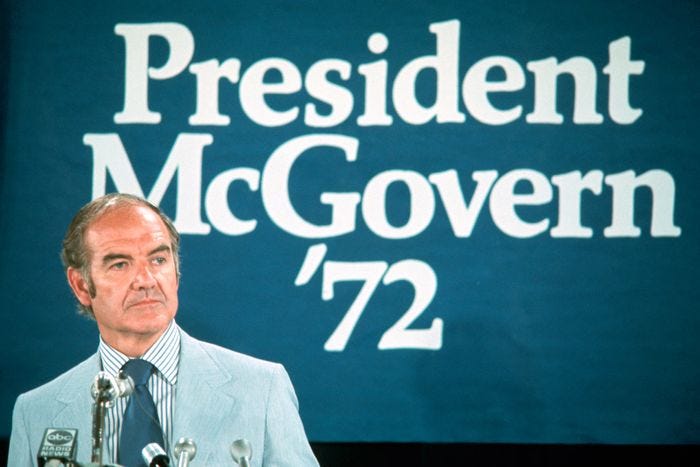McGovern versus Nixon: Another Perspective
W.J. Astore
In the presidential election of 1972, Richard Nixon destroyed George McGovern. McGovern won only one state, and it wasn't even his home state. Of course, Nixon soon experienced his own destruction with Watergate, but the fact remains that McGovern and the Liberal/Left wing of the Democratic party never fully recovered from their drubbing in 1972.
And what a shame that was for America. I've been reading "The Liberals' Moment: The McGovern Insurgency and the Identity Crisis of the Democratic Party," by Bruce Miroff, and the more I read, the more impressed I am by McGovern's principled stance against the Vietnam War, and war in general.
Miroff cites a Senate speech McGovern made in September of 1970 that deeply impressed me. McGovern didn't mince words as he called his fellow senators to account for their complicity in approving and continuing war in Southeast Asia:
Every senator in this chamber is partly responsible for sending 50,000 young Americans to an early grave. This chamber reeks of blood. Every senator here is partly responsible for that human wreckage at Walter Reed and Bethesda Naval [hospitals] and all across our land--young men without legs, or arms, or genitals, or faces, or hopes. There are not very many of these blasted and broken boys who think this war is a glorious adventure. Do not talk to them about bugging out, or national honor, or courage. It does not take any courage at all for a congressman, or a senator, or a president to wrap himself in the flag and say we are staying in Vietnam, because it is not our blood that is being shed. But we are responsible for those young men and their lives and their hopes. And if we do not end this damnable war, those young men will some day curse us for our pitiful willingness to let the Executive carry the burden that the Constitution places on us.
Blunt and powerful words! How refreshing they are compared to the weasel words that come from Congress today. Unsurprisingly, McGovern's principled stance against the war, and his gutsy call for the Congress to do something to stop it, were unpopular among his fellow senators. He didn't care about them. He cared about saving lives and ending war.
Now, what was Nixon up to? He'd hoped he'd be running against McGovern, expecting he'd be vulnerable to dirty tricks. Reading Miroff, I discovered that Nixon, among other dirty tricks, actually discussed planting McGovern campaign material in the apartment of Arthur Bremer, the man who'd tried to assassinate George Wallace in May of 1972. Nixon's scheme was only abandoned when it was learned the FBI had already sealed Bremer's apartment.
Think of Nixon's scheme here. He was already well ahead of McGovern in the polls, his reelection a near-certainty, yet Nixon would stop at nothing to tear McGovern down. It was such dirty tricks, of course, that would lead to Nixon's downfall with Watergate.
History shows that Nixon won the election of 1972, but McGovern was the real winner in life. Nixon continued to prosecute a war with devastating consequences; McGovern fought to stop it. Nixon ran a dishonorable campaign; McGovern a hopeful one, an idealistic one, one that called on Americans to live up to their rhetoric of freedom and self-determination and charity.
Who was the "winner" again?





